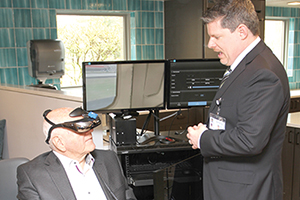
Vince Foglia gets a demonstration of virtual reality therapy from Patrick McGrath at the opening of the AMITA Health
Foglia Family Foundation Residential Treatment Center in suburban Chicago. McGrath is executive director of the facility and Foglia directs a donor foundation.
The building on the campus of AMITA Health Alexian Brothers Medical Center in Elk Grove Village, Ill., was constructed in the mid-1970s as a dormitory-style residence for members of the Alexian Brothers order. It housed up to 48 brothers at its peak occupancy. Over the ensuing decades, though, as the number of Alexian Brothers declined, only a half dozen men lived there. A large portion of the building sat empty.
The repurposing of the building benefits the brothers, who sold their building and will move into a new single-story residence on the campus in the next few months. And it closes a gap in the continuum of behavioral health services for AMITA, which comprises nine hospitals and a network of more than 3,000 physicians serving the west and northwest suburbs of Chicago. AMITA was formed in 2015 as a joint operating company by the Alexian Brothers Health System, which is part of Ascension, and Adventist Midwest Health, which is part of Adventist Health System.
Higher purpose
Clay Ciha, president and chief executive of AMITA Health Alexian Brothers Behavioral Health Hospital, said, "The brothers' house was really laid out as a residence. When we approached the brothers, they said they would like to build a smaller residence and would be happy to turn over the larger one. It turned out to be a perfect fit for us.
"The Alexian Brothers have always embraced helping the mentally ill and addicted people of our society," Ciha said. "They have always taken them in." The repurposing of their residence is a "very natural extension" of this work.
Their former residence underwent structural upgrades inside and out: tuck-pointing, new HVAC and fire prevention systems, and the addition of an elevator. The brothers' old rooms have been spruced up, and AMITA committed to more extensive renovations in the common areas, including a new exercise room, therapy rooms and converting a garage into offices.
Upping the odds for recovery
Ciha stressed the importance of a residential level of behavioral health care to sustaining recovery in high-risk patients. Following inpatient treatment for an acute mental health episode or a stay in a detox unit, it is usual for behavioral health patients to get ongoing treatment as an outpatient or participate in a day treatment program. Patients who have tried multiple medications and therapies and yet remain at high risk for relapse are candidates for ongoing intensive treatment in a residential care setting. Depending on the nature and complexity of their diagnosis, patients will stay at the facility for three to six weeks. Ciha expects it to treat about 500 patients annually, drawing from the greater Chicago region and across the Midwest.
"You have a set of patients that benefit from 24-hour care for weeks, instead of days," he said. "This is an opportunity for recovery to take hold and long-term change begins."
An extended stay in a residential treatment facility also offers time to introduce patients to community-based providers for the next phase of recovery and to work with families to change the home environment when patients are discharged, said Patrick McGrath, executive director of the Foglia treatment center. He is a clinical psychologist and an expert in the treatment of obsessive-compulsive and other anxiety disorders.
McGrath said the facility will be just the fourth in the country to offer residential services for anxiety disorders. "There's even fewer centers that can treat patients dual-diagnosed with chemical dependency and anxiety," he said. "Now, if you suffer from both, you might have to go from one facility to another. You could be changing philosophies and treatment plans. That won't be the case here."
He also noted the proximity of AMITA's acute care facilities — one is within walking distance of the Foglia treatment center. Alexian Brothers Behavioral Health Hospital is a short drive away. "So when someone is discharged, we can start them right away at the residential center without an interruption in service."
In service to veterans
AMITA's residential treatment center also has carved a niche for veterans suffering from post-traumatic stress and other disorders. Thanks to donations to the Alexian Brothers Foundation, four rooms have been set aside specifically for veterans, and will provide them therapy for very low cost.
"What a wonderful opportunity to make an impact for those who have given so much to our country," McGrath said. "Whatever we can do to help reduce the number of veterans who are struggling and help them cope with post-traumatic stress — I see that as living the mission and values of what AMITA and the brothers have stood for."
One of the reasons that anxiety disorders and OCD most often are treated in an outpatient setting is the cost versus residential care. But in the end, Ciha noted, residential care can become cost-effective for certain individuals.
"If you spend a little bit more money on residential care, but hopefully you don't have people coming back through treatment again and again, it becomes cost-effective," he said. "For those who need more help in stabilizing, this is an option that is not only welcome, but necessary, and overdue."
Copyright © 2017 by the Catholic Health Association
of the United States
For reprint permission, contact Betty Crosby or call (314) 253-3490.